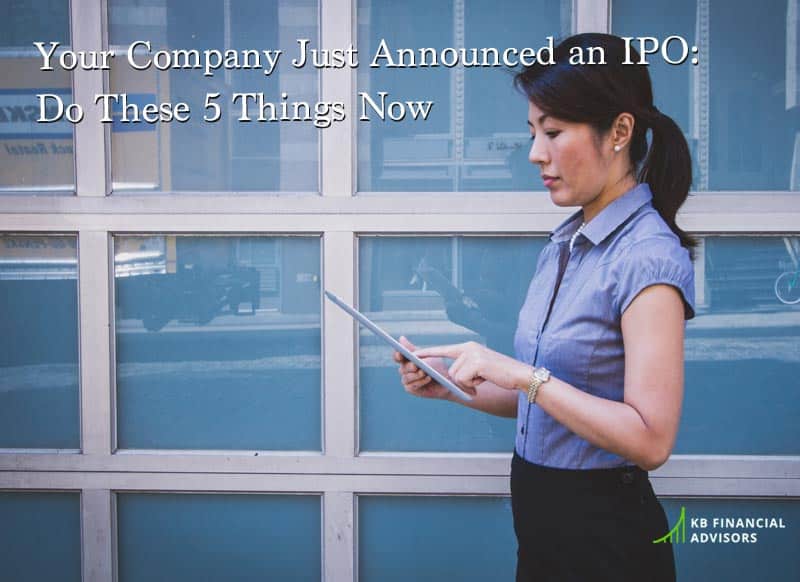If you’ve been waiting for your private company to go public so you can offload some of your shares, you might not have to wait until the initial public offering (IPO).
With a tender offer, you could sell some or all of your shares without the waiting or speculation that comes with an IPO.
What Is a Tender Offer?
Early employees of a startup typically get stock options, and they can exercise those options once they become fully vested.
But if your company doesn’t have any plans to go public anytime soon, you could be stuck with the cost of exercising your options without any guarantee that you’ll be able to sell.
With a tender offer or a secondary offering, you get that opportunity.
A tender offer is when an investor makes a proposal to buy shares from existing shareholders of a company, usually at a higher price than what the shares are worth at the time of the proposal.
Secondary offerings can also be made to shareholders of public companies that have already done an IPO. In this case, it’s a little less messy. You’d simply get the benefit of a higher share price.
To better understand these offers, let’s look at a recent one that attracted tons of industry attention: Uber.
A Real Life Tender Offer: The Uber-Softbank Deal
In November 2017, rideshare service company Uber inked a deal with a consortium led by Softbank and Dragoneer to allow a tender offer.
The investor group hopes to have a total ownership of 14 percent of the company by buying up shares from Uber employees and other shareholders.
According to the terms of the deal, eligible employees with stock options can sell up to 50 percent of their holdings, while employees with restricted stock units can’t sell at all. Other investors, however, can sell as much as they want to. All shareholders are being asked to verify accredited investor status (see our latest post).
If the tender offer is completed, many early Uber employees could become millionaires overnight.
Other 2017 tender offers include one in April by Cyclops Holdings, LLC, a subsidiary of Intel, and one in October by Qualcomm River Holdings B.V., a subsidiary of Qualcomm Inc. The former sought to purchase all of the outstanding shares of Mobileye N.V., and the latter offered to purchase all of the outstanding shares of NXP Semiconductors N.V.
Thinking About Your Own Tender Offer and How to Prepare
If you own shares in a company and a tender offer is made, don’t make any decisions — yet! First, take the following steps to make sure you’re prepared to make the right choice.
- Watch the news: Truth be told, this is the only time we’ll ever offer this advice. The news can make it hard to make good investment decisions, but in this situation, staying current on the latest developments can help you learn everything possible about the potential deal.
- Call your financial planner: Do this immediately to make sure you’re ready to act with confidence when the deal is finalized. (In this case, it clearly helps if you have a planner who understands your industry and has experience providing guidance and advice in this area.)
- Get organized: Get all of the facts in one place. You’ll want to know specific details like the number and type of options you have, how many shares you own, and the exercise price.
- Understand how the sale would affect your taxes: Get some information on the potential sales price of the tender offer. Also, get a copy of your most recent tax return and calculate your alternative minimum tax (AMT) credit carryforward if you have one.
- Decide what your goals are: What are you hoping to achieve or get out of an offer should you get the opportunity to act on one? Will you sell? If so, how many shares? You may be limited to how many you can sell so make sure you know this about the deal.
Finally, if you’re a past employee, you’ll need to double-check to see what may or may not apply to you in a tender offer.
After the Offer: What to Do Next
If you decide to participate in the tender offer and the deal goes through, you’re not quite out of the woods yet. Here’s what to think about in order to properly finalize the details.
First, make sure you have the transaction confirmations and update your tax projections accordingly. Since the tender offer will increase your tax rate, you’ll want to evaluate some ways to reduce your adjusted gross income.
For example, you can prepay state income taxes to increase your itemized deduction. You can also max out your 401(k) or make multiple years of charitable deductions.
Then, consult with a tax professional to find other opportunities to lower your tax liability.
Tips on Using Your Newly Accumulated Wealth
Once you have the money in the bank, you’ll want to start putting it to work immediately. Here are a few options to consider:
- Taxable brokerage account: With this kind of investment account, you’ll pay income tax on interest and dividends and capital gains when you sell.
- Tax-deferred 401(k) or Nondeductible IRA: With this account, you’ll be taxed on all growth and income will be deferred until you withdraw cash from the account, preferably in retirement.
- After-Tax 401(k): Additional contributions made beyond the annual deduction limit (currently $18,000) up to the total defined contribution plan limit (currently $54,000).
- Health Savings Account (HSA): If you have a high-deductible health plan (HDHP), you can contribute to an HSA, which allows for tax-free growth and distributions as long as they’re for qualified medical expenses. If you don’t have an HDHP, consider switching to one to take advantage of this tax break.
- Deferred compensation plan: If your employer offers this benefit, consider using it to defer some of your salary for the future.
Note that some of these strategies are very advanced. In most cases, it’s wise to hire a financial planner who can walk you through the process of deciding which, if any, is best for you.
In other words, do not try this at home alone!
Will We See More Secondary Offerings in the Future?
In January 2017, Fortune noted that IPOs were down a whopping 65 percent since 2014. Harvard Law School also found that the number of public U.S. companies is dropping, mostly due to mergers and acquisitions and delistings.
As a result, there are many shareholders of private companies that have shares or options they can’t do anything with — and a lot of investors who want to get a piece of the pie.
Some companies to watch regarding tender offers include Airbnb, Dropbox and Pinterest, all companies that have resisted setting IPO plans in stone.
What All This Means for Tech Employees
Secondary offerings come with both good and bad consequences for employees — especially employees of tech companies that garner a lot of private investor interest.
The good news? The main benefit of being the target of a tender offer is that you have an earlier opportunity to sell your shares. This essentially converts your human capital into real dollars, through stock options, and can help you build wealth for the future.
But there’s a downside, too. There’s no guarantee that a tender offer will go through. Also, employees don’t have much control over how a tender offer plays out.
Terms of the deal are hashed out by the board and directors and large investors. Employees simply have to sit and wait until the deal is finalized before they can make their decision.
Despite the negatives, a tender offer can be a good opportunity for you as a shareholder. As previously mentioned, work with a financial planner to help guide you through the process and determine how to make the best decision for your situation.



